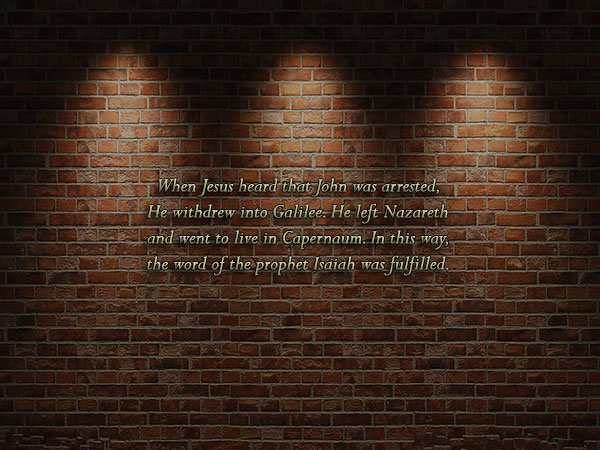INITIALLY, I THOUGHT Dallas Jenkins, creator/director of “The Chosen,” was too sassy for my taste. I only put up with him to get through my favorite series. Until recently, when I watched him simply out of curiosity, because Season 2’s Episode 8 finale will have to wait out some months to usher in the third season. And I had the time already to parse my last view of his interview with Levi and Jennie Luskos. He wasn’t so bad there, not because he wasn’t the host and, therefore, did not usurp the conversation, but he talked slower than usual (which is still fast by native speaker standards, but agreeable to me) and only in response to questions from the couple. He was all right. He made me listen up. And boy! did I indeed. I could not be more grateful that I sat through his audience with the Luskos, for he described the series, a collaboration of cast, crew, and the whole kit and caboodle of “Christology” as authentic, intimate, playful, and disruptive. I lingered on the last adjective, taken aback by its radical hint, but not long enough for I expected an explanation, which he gave before I could have another think. This was probably what Ate Myla felt when she said what she said (more about this later). But Dallas was not merely calling attention to himself by his different approach to storytelling, for he does take responsibility for the viewers’ reaction to his work when they would call him names, such as blasphemer, heretic, false prophet, cult leader, violator of Scripture, or, reinventing the bible (although this wasn’t in his enumeration and I wouldn’t be surprised if it cropped up). To be fair, however, he could not believe the fantastic majority of the show’s followers who claim to have been brought closer to God (like me) even if some say his show sucks and needs to be removed from the face of the earth. The interesting thing about Dallas is that he is not shaken by the negative press but, on the contrary, more motivated to write what’s acceptable to God, for he believes that the rest is also up to Him. When one gets to the point of exaggerated love and hate, is what he seems to say, one doesn’t care anymore but simply surrender. To God, the only just and greatest leveler.
The interview started with Levi and Jennie sharing with Dallas their post of their 9-year-old daughter dancing to the opening song, and not fast-forwarding to the credits. Which was shared by many who had children like the couple doing what she did. I loved his description of the theme song “Walk on the Water” as an announcement (if you knew your rosary, think Annunciation), a Southern Gospel, slave spiritual, with a little bit of Middle Eastern flair thrown in, which cues the watchers right off the bat that what they are going to watch is not a typical bible show that’s probably boring, emotionally distant, and with the characters speaking in King’s English. Because, Dallas said, when he was growing up, he had nothing in the Christian world related to his faith, that children like him (and me) at that time took seriously, certainly not a Jesus project. Even his bible major in college never got him close to it. So it also came as a surprise to him that the show, which doesn’t go by the normal rules and has a different tone, became the success that it is.
Levi took that up as a cue to talk about their 9-year-old Daisy, who whispered to him as the opening song came up, “Dad, that one fish is telling the other fish to ‘Go with it.’” It’s the line “I don’t care about the mess you’ve been,” which Levi aptly described as “a fun place to begin.”
It was significant that Dallas mentioned the Nashville singer, Ruby Amanfu, a Grammy Award winner, as probably Jamaican, because her ethnic voice captured the essence of the song.
Levi could not get over Jesus and His backpack which, Dallas said, is the aim of the series, to portray Jesus’ humanity. As when He winked His eye at a disciple in Episode 2, made fun of His hometown, and when He danced and teased with His men at a wedding, asking Simon if he can help Andrew to be a better dancer.
Stressing the human side of Jesus has enhanced Dallas’ adoration of Him (I know it did me), as when He dressed His wound in the Garden of Gethsemane, flexed His muscle in the Garden of Olives, or brushed His teeth, quirky, weird, beautiful things we would not have otherwise seen had Dallas been of the old, conventional, reverent-to-excess school.
He cited that God told the Israelites to depend daily on manna, not store it up and live comfortably. He was recalling the time when his “Resurrection of Gavin Stone” bombed at the box office. There were bills to pay and the grim prospect of losing the house, and other marital matters. But the frustration did not get to him. One dawn in January, he was writing a memo on how low his career has been going downhill, when he saw an fb post from someone he did not know. The man was coming out of the grocery and claimed that God placed in his heart to tell Dallas not to feed the five thousand but to provide the loaves and fish. It dawned (no pun intended) on Dallas that his feeling was like that of Jesus’ need to feed the multitude. Because if He allowed them to go home hungry, they will faint along the way. He felt responsible for the droves because He allowed them to follow Him. So all He had to do was nourish them. When Dallas surrendered to God, he realized that He agreed to make him do “The Shepherd,” the fruit of his failure, instead of fret over the flop of his movie “The Resurrection of Gavin Stone,” a Hallmark type film, by his account. He accepted that it wasn’t his time to shine. Originally meant as a Christmas service for his church, “The Shepherd” was a hit, turned out to be a catalyst, and its proceeds gave them enough loaves and fish to finance “The Chosen.” Netflix is now resurging his resurrection flop. Which meant that the earlier 95% exceeding-expectation rating it got was not a fluke.
To which Levi agreed by saying that there are two kinds of people: one that gives you hosannas or crucifies you. So the thing to be is a child of God always, whether you are amazing or crushing.
At this point, Dallas asked the couple how they walked through the tragedy of the death of their 5-year old Lennya, eight years ago. Jennie answered matter-of-factly that it told them life is short, He gave them a task, so they ran with it. Levi’s answer was that it was an ongoing mechanism, like a veil being removed to show them that night is coming, so they prepared, slowed down, caught up, took a breath and, suddenly, he shouted, “Wait, we’re the interviewers here!”
When the laughter died down, he said that his only worry was who is watching their little girl. This was my cue. Because they were Christians, I answered on the message portion: Mary!
Dallas picked up on the subject of children by saying that the episode of Jesus with the children meant to inform the audience what the show is up to.
I also like his indifference to opinions about his work, which more than speaks for itself.
“Trouble,” another original score, sets the tone of the scene where the disciples are walking towards Samaria.
I noticed I’ve stopped watching Hallmark movies since I started looking forward to his eight seasonal installments. Maybe when I’m done with this piece, which has taken me almost a month now to write. And even now that I’m recollecting my thoughts on them. Just can’t get enough of the evolving bread that the show fills my hunger with.
I grew up on the Ten Commandments and similar biblical stuff which were pretty much standard, by the rules and, to a young irrepressible mind, boring to an adolescent extent.
Jonathan Roumie is not Jesus, Dallas made it clear, even if his kind eyes capture His essence, and the show is not the bible. Jonathan is not worthy, struggles because of it, and really makes an effort to deliver a performance that lives up to his character’s likeness.
The Luskos mentioned the bickering of the disciples and compared it to that of their children. Dallas was quick to add the arguments of Simon and his wife Eden as what makes the series relatable. Like in the past when he and wife Amanda would argue about the lemons life tossed them. Yet she would always be driven by God to the Old Testament failures to guard against success. Which made them watch out and stay in the state of brokenness. Because success is more dangerous and difficult to navigate through. Which Levi supported by saying we are, like Pope Francis said, the Resurrection people, because power comes from the most difficult pain. Jennie added that losses and failures are new opportunities to trust God and one another. Dallas said he may have been disappointed in his career but never was he wanting for joy in life. He needed to be a broken vessel, like Jesus was crushed in the Gardens of Gethsemane and Olives. Levi made light of the moment when he recalled Alan Shepard Jr., the second man (and first American) in space, who realized that they were not totally prepared when he peed in his suit because they forgot diapers.
In the episode where Jesus healed a long line of sick people, He was apparently not in control, shown in the scene when He passed by Mary and the disciples but went through them to His tent for He was spent. He let His mother minister to Him. I thought it beautiful that He “parented” His parent here. Like He lets His men slip for Him to take over, never letting His will overpower theirs. He never overdoes His parenting because He never was one and, therefore, is reciprocated, given His authority, through a brotherly reverence.
Being seasonal helps the show find flaws, correct them, and be true to the mandate they perceive from God. It also makes the episodes current for the audience to easily catch up, connect to (and identify with) the characters.
He owned me when he said he’s just another tool in Christ’s carpentry box. We are all people in God’s tool box.
Which made Levi very human to me because he could not contain his delight when he saw Jesus walking around with a backpack (from an honest-to-goodness Texas cow), which resonated to him. Especially because of the generosity of a couple who handstitched that backpack and the knife sheaths. When the time for Dallas to ask for the invoice, the couple charged them zero dollars. So they thought of a similar noble way to reciprocate their charity.
I grew up on the Ten Commandments and similar biblical stuff which were pretty much standard, by the rules, and boring to a certain extent. Therefore, “The Chosen” struck me as a novel, endearing, refreshing interpretation of the life of Jesus.
My friend Myla did not agree (nor disagree) on the episode that featured Him practicing the sermon with Matthew. She could not believe Jesus needed to practice (what He lived, I could tell where this bible-reader was coming from) and I let it slide in deference to her. But I believed that He was being Man with Matthew by simultaneously shedding His Godhood so He could imbibe both. Besides, if I were to wear the director’s cap, I’d be hard put at enumerating the beatitudes as brilliantly as Dallas did.
Perhaps the show’s biggest magnet is the lead character Jesus, convincingly portrayed by Jonathan Roumie, whose Jesus eyes speak volumes and is known to struggle playing the role because he does not feel worthy. Which Dallas counters by saying he plays the role so well that audiences say he makes them feel Jesus is the kind of guy one can sit around the fire with and chat up. He is so simple his (scripted) radical actions and ideas change lives every episode.
Once in a while, like Mel Gibson’s “The Passion of the Christ,” a show comes along and shakes our earth. I pray that he passion, kindled in me by both film and series, pursues me until “The Shepherd” and “The Resurrection of Gavin Stone” so I can go back to my Hallmark leisure. Amen.










